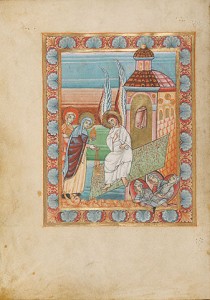Thoughts on Today’s Lessons for Sunday, March 31, 2013.
First Reading: Isaiah 65:17-25Writing at the end of the book of Isaiah, the prophet celebrates the people’s return from exile. Although there is still much work to be done, Isaiah celebrates God’s promise to make Jerusalem a virtual heaven on earth, where everyone will enjoy abundance and happiness, peace and joy. As Christians celebrate the resurrection of Jesus today, we too imagine a new kingdom where all will be physically and spiritually fed.
Psalm: Psalm 118:1-2, 14-24
Matthew interpreted the “stone the builders rejected” in this Psalm as an image of Jesus, but this song of victory goes deeper still as it exults in God’s never-ending love that saves us and promises everlasting life. Note well, however, that to enter the kingdom of heaven, we are expected to be righteous, and that means practicing justice in our lives, not only to God but to our neighbor and the poor and the stranger, too. Then we may rejoice, singing, “This is the day that the Lord has made; let us rejoice and be glad in it.”
Second Reading: I Corinthians 15:19-26
Paul is speaking pastorally to the Corinthians today, trying to explain what Christ’s resurrection means to us, the people of the church. Recalling Adam’s fall and the ancient Jewish tradition of offering the first fruits of the harvest to God, Paul reminds the Corinthians – and us – that the glory of the resurrection is not only the promise of God’s kingdom on earth but of eternal life. If Christ has risen, then all who believe in him will also rise again.
Gospel: Luke 24:1-12
Here is the Good News, the most important Gospel story, and all four evangelists agree on the basics: Jesus’s friends, including Mary Magdalene, come to the tomb on Sunday morning and find it empty. But eyewitness accounts of great events often differ on the details, and the Gospels are no exception. Only Luke, for example, names the women who had come with Jesus from Galilee as the first to learn that Jesus was risen. They ran back to tell the rest. Does it surprise us that the men didn’t believe them until they went to see for themselves?

